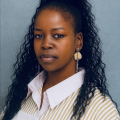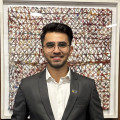Emerging Scholar Awards


For each conference, a small number of Emerging Scholar Awards are given to outstanding graduate students and emerging scholars who have an active research interest in the conference themes. Emerging Scholars perform a critical role in the conference by chairing the parallel sessions, providing technical assistance in the sessions, and presenting their own research papers. The 2026 Emerging Scholar Award Recipients are as follows:

McGill University, Canada
Jacob Kwakye is a second-year PhD student in Social Work at McGill University whose research explores women’s leadership in climate action across Sub-Saharan Africa. He is particularly interested in how women shape community responses to environmental challenges and how their voices can influence policy and governance. Jacob holds an MPhil in Climate Change from the University of Energy and Natural Resources, Ghana, and a BA in Development Education from the University for Development Studies, Ghana. His academic journey is fueled by a deep commitment to social justice and sustainability. Outside of academia, he is passionate about mentoring young scholars, engaging with grassroots organizations, and promoting knowledge that empowers communities to confront the realities of climate change.

Drexel University, USA
Essien Oku Essien is a PhD candidate in Communication, Culture, and Media Studies at Drexel University (Philadelphia, USA). His research examines the intersection of climate change and spirituality/cultural epistemology in the Global South, with a focus on semiotics, post-coloniality, and “spirito-digital” public spheres. He has presented internationally and earned multiple recognitions across the US, Canada, Argentina, Italy, Sweden, Mexico, Ireland and Nigeria, and serves in student leadership roles advancing global graduate engagement. A certified Climate Reality Leader, Essien’s work bridges rigorous scholarship and public impact, informing policy dialogues and community initiatives.

Cerge-Ei, Czech Republic
Hieu Thi Hoang Nguyen is a PhD candidate in Economics at CERGE-EI in Prague, focusing on environmental and development economics. Her current projects include a study using a novel “NetFires” instrument to identify the impact of fire-driven pollution on child health in India, alongside studies on willingness-to-pay for clean air, heat and crime in South Africa, and climate-driven migration. Methodologically, Hieu works extensively with large survey and satellite datasets, employing designs such as instrumental variables, difference-in-differences, and mediation frameworks. Her works have been published in Heliyon (2021) and the Eurasian Business Review (2023), and she has participated in conferences and summer schools across Europe and Asia. Hieu also lectures in Econometrics, Microeconomics, and Macroeconomics.

University of Pennsylvania, United States
Maya Lis is a Master’s student in Environmental Policy at the University of Pennsylvania. Her research focuses on sustainable waste management and socio-technical transitions, with a current project examining the potential of electro-composting as an emerging technology to accelerate organic waste decomposition, reduce emissions, and support circular economy goals. Using a socio-technical transition framework, she analyzes the technical, economic, business, and behavioral factors influencing adoption in both rural and urban contexts. She is passionate about connecting environmental technologies with policy and community action to foster sustainable and equitable waste management systems.

Kyoto University, Japan
Yatong Yang received her PhD from Kyoto University’s Graduate School of Global Environmental Studies. Her research examines the intersection of international law and climate change, with a focus on how legal frameworks can respond to the challenges of sea-level rise and the disappearance of state territory. Her doctoral dissertation developed the concept of “climate sovereignty” as a basis for rethinking rights and obligations in international law. She has presented her work at academic conferences and published on topics in environmental law and global governance. Beyond academia, she is engaged in cross-cultural exchange as a Rotary Yoneyama Scholar alumna.

Tshwane University of Technology, South Africa
Dr Sindi Mokgopha is a passionate lecturer and researcher specialising in Green Cities Financing, Public Policy, Sustainable Education, and Climate Change. Her work focuses on developing policy frameworks that promote climate resilience, urban sustainability, and educational transformation. Committed to academic integrity and quality assurance, she advocates for ethical, innovative, and sustainable teaching practices. Through an interdisciplinary approach, Dr Mokgopha bridges environmental stewardship with education reform, aligning local initiatives with the Sustainable Development Goals (SDGs) and empowering decision-makers to build greener, more equitable, and resilient communities for future generations.

University of Hertfordshire / World Economic Forum, United Kingdom
Dr Eric Shahzar is a Lecturer in Law at the University of Hertfordshire, specialising in environmental law, human rights, and climate justice. He is an early career researcher whose work examines climate-induced displacement, structural inequality, and the political dimensions of climate governance, with a particular focus on the Global South. His research has explored new legal and policy pathways for addressing climate displacement and accountability in vulnerable regions. Dr Shahzar is an Agenda Contributor to the World Economic Forum on climate risk and migration, and an editorial contributor to the United Nations Office for Disaster Risk Reduction (UNDRR). His work bridges normative theory, empirical analysis, and policy engagement.

Council on Energy, Environment and Water, India
Meet Kumar is an Urban and Regional Planner with expertise in climate adaptation across urban and rural systems, combining geospatial analysis with community-based approaches. His academic research developed a microclimate assessment framework for Indian cities, proposing built-environment strategies to mitigate heat stress. He is currently working as a Research Consultant with the Climate Resilience team at the Council on Energy, Environment and Water, one of Asia’s leading think tanks. He has also worked with the UN-Habitat Secretariat in Nairobi on themes of climate migration and humanitarian planning

University of Nigeria, Nsukka, Nigeria
Gloria Ekenedilichukwu Amadi is a teaching staff and researcher specializing in Climate Change, Energy and Environment at the University of Nigeria, where she is currently pursing a PhD. She holds a Bachelor of Science (BSc) Degree in Sociology & Anthropology and an Master of Science (MSc) Degree in Environmental Sociology. Gloria has over ten years experience as an administrative staff before her conversion to academics. Her research focuses on Climate Change Adaptation and Mitigation, Actions and Responses especially for the vulnerable communities, with emphasis on the social impacts of climate change. Gloria have over five years of teaching experience and several National and International Journal Publications. She is also recognised for her technical proficiency and diverse professional background.

Michigan Technological University, United States
Mercedes Asamani is a Doctoral Candidate in the Environmental and Energy Policy program at the Michigan Technological University. Working at the intersection of science, society, and technology, her research focuses on shaping justice-driven climate and energy policies, and technologies that recognizes the unique realities of marginalized communities within the United States and Sub-Saharan Africa. She through her Greenlead African Climate Leaders Fellowship is recognized as a leading voice shaping the climate agenda in Africa while working with rural and low-income regions in the United States.

Oregon State University, United States
Kanchan Ojha is a PhD student in Environmental Sciences at Oregon State University. Her research examines the social dimensions of climate change issues, with a focus on wildfire governance, risk perception, and policy processes. Drawing on frameworks such as Cultural theory, Kanchan’s work explores how worldviews shape preparedness and adaptation in Wildland-Urban Interface communities for wildfire management. Kanchan has served in university and community leadership roles and is an AGU (American Geophysical Union) Voices for Science alumnus and Local Science Partner. Her outreach centers on inclusive, evidence-based climate communication, and she’s passionate about women and minority issues.

York University, Canada
Dr. Liton Chakraborty is a Visiting Scholar and Adjunct Member in the Graduate Program of Disaster and Emergency Management at York University, Canada. His research focuses on disaster risk reduction, environmental justice, and climate resilience, using innovative tools such as GIS, spatial econometrics, and intersectional Gender-Based Analysis Plus (GBA+) to promote more inclusive and equitable policies. His pioneering work on socially just flood risk assessment has been featured in multiple national news media in Canada. Dr. Chakraborty received Public Safety Canada’s Creativity and Innovation Award and served as an invited panel speaker at the UNESCO International Conference on Climate Risk, Vulnerability, and Resilience Building. He holds a Ph.D. in Geography and Environmental Management and an M.A. in Economics from the University of Waterloo, as well as an M.Sc. in Business and Economics from Uppsala University
As an Emerging Scholar, I had the privilege of moderating panels and leading discussions alongside distinguished experts, academics, and practitioners. The warm welcome I received made my inaugural experience outside Asia both memorable and profoundly meaningful."
With the emerging scholar program I was able to learn, connect, and present my research. Without this program, I would have not had this opportunity so thank you so much!"
As an Emerging Scholar, I aimed to create a cohesive and positive experience for all participants. I enthusiastically embraced the role of chairperson. By warmly introducing presenters and facilitating smooth proceedings, I ensured seamless transitions and a sense of connection between speakers and the audience. It was a fantastic experience.
I am sincerely honored to have been selected as a recipient of the Emerging Scholar Award. Thanks to your generosity, it is now evidently possible for me to believe that my research on the impact the environment has on human health will get a global audience with a clear possibility that the appropriate actions will be enacted on by the governments and necessary regulatory bodies and organizations."
As an Emerging Scholar Awardee, it was a great experience in France meeting distinguished scholars from diverse backgrounds and sharing knowledge and experiences. Thanks and gratitude to Common Ground Research Networks for organizing such an event."
The Emerging Scholar Award has not only given the opportunity to showcase my paper but also an an opportunity to learn from other scholars working in the field of climate change."